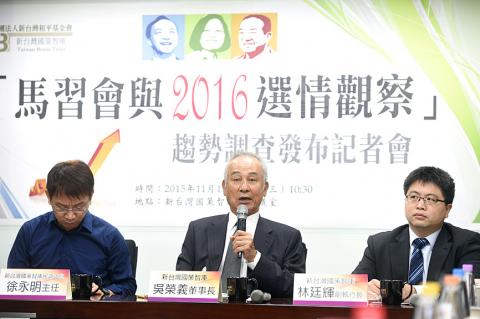The meeting between President Ma Ying-jeou (馬英九) and Chinese President Xi Jinping (習近平) earlier this month damaged support for the Chinese Nationalist Party (KMT) and boosted negative perceptions of China, especially among young people, a poll released yesterday showed.
Although most KMT politicians have described the Ma-Xi meeting as a positive move, a poll conducted by the Taiwan Brain Trust think tank indicated that the meeting led to a decreased approval rating of the party among pan-blue supporters.
According to the poll, the approval rating for the KMT dropped 1.2 percent from 20.8 percent in September to 19.6 percent, while the Democratic Progressive Party’s (DPP) approval rating showed a 0.3 percent drop from 42.3 percent to 42 percent.

Photo: George Tsorng, Taipei Times
However, the DPP’s disapproval rating dropped from 45 percent in September to 37.7 percent, making it the first time this year that the party’s approval rating surpassed its disapproval rating, the poll showed.
“The Ma-Xi meeting was the first time the leaders of Taiwan and China met,” Taiwan Brain Trust executive director Lee Ming-chun (李明峻) told a news conference. “The KMT’s approval rating dropped after the meeting, especially among pan-blue supporters, which went from 49.3 percent [in September] to 47 percent this time, showing that there are still anti-Communist pan-blue supporters who are disappointed by the Ma-Xi meeting.”
Although the Ma administration has worked over the past seven years to enhance the cross-strait relationship, 39.2 percent said they have a negative perception of China, with only 15.9 percent expressing a positive perception of the nation, while 36.1 percent said they have “no feelings” toward China, the poll showed.
The percentage having a negative perception of China went up by 1.9 percent from 37.2 percent in September, before the Ma-Xi meeting, while respondents who indicated “no feelings” dropped by 2.4 percent from 38.5 percent, it showed.
Those with a positive perception of China dropped by 2.8 percent from 18.7 percent, it showed.
In addition, 66.7 percent of respondents said that Taiwan is a sovereign and independent nation, while only 21.8 percent disagreed with the assertion, the poll showed.
In response to the question of whether Taiwan should become an independent nation or unify with China, 61.4 percent supported independence, while 12.3 percent opted for unification, the results showed.
As for self-identity, 87 percent of respondents identified themselves as “Taiwanese,” while 6.1 percent considered themselves “Chinese,” it said.
The poll indicated that people aged from 20 to 29 are notably more pro-independence than other age groups, with 81.9 percent of respondents in their 20s saying Taiwan should become an independent nation.
Ninety-eight percent of those in that age group identified themselves as “Taiwanese.”
The results showed that DPP presidential candidate Tsai Ing-wen (蔡英文) has 48.4 percent support, the KMT’s Eric Chu (朱立倫) has 20.4 percent, while the People First Party’s James Soong (宋楚瑜) has 9.3 percent ahead of Jan. 16’s election.
The poll was conducted on Friday and Saturday last week, with 1,108 valid samples collected.
It has a margin of error of 2.9 percentage points.

ANOTHER EMERGES: The CWA yesterday said this year’s fourth storm of the typhoon season had formed in the South China Sea, but was not expected to affect Taiwan Tropical Storm Gaemi has intensified slightly as it heads toward Taiwan, where it is expected to affect the country in the coming days, the Central Weather Administration (CWA) said yesterday. As of 8am yesterday, the 120km-radius storm was 800km southeast of Oluanpi (鵝鑾鼻), Taiwan’s southernmost tip, moving at 9kph northwest, the agency said. A sea warning for Gaemi could be issued tonight at the earliest, it said, adding that the storm is projected to be closest to Taiwan on Wednesday or Thursday. Gaemi’s potential effect on Taiwan remains unclear, as that would depend on its direction, radius and intensity, forecasters said. Former Weather Forecast

As COVID-19 cases in Japan have been increasing for 10 consecutive weeks, people should get vaccinated before visiting the nation, the Centers for Disease Control (CDC) said. The centers reported 773 hospitalizations and 124 deaths related to COVID-19 in Taiwan last week. CDC Epidemic Intelligence Center Director Guo Hung-wei (郭宏偉) on Tuesday said the number of weekly COVID-19 cases reported in Japan has been increasing since mid-May and surpassed 55,000 cases from July 8 to July 14. The average number of COVID-19 patients at Japan’s healthcare facilities that week was also 1.39 times that of the week before and KP.3 is the dominant

The Chinese Communist Party’s (CCP) working group for Taiwan-related policies is likely to be upgraded to a committee-level body, a report commissioned by the Mainland Affairs Council (MAC) said. As Chinese President Xi Jinping (習近平) is increasingly likely to upgrade the CCP’s Central Leading Group for Taiwan Affairs, Taiwanese authorities should prepare by researching Xi and the CCP, the report said. At the third plenary session of the 20th Central Committee of the CCP, which ended on Thursday last week, the party set a target of 2029 for the completion of some tasks, meaning that Xi is likely preparing to

US-CHINA TRADE DISPUTE: Despite Beijing’s offer of preferential treatment, the lure of China has dimmed as Taiwanese and international investors move out Japan and the US have become the favored destinations for Taiwanese graduates as China’s attraction has waned over the years, the Ministry of Labor said. According to the ministry’s latest income and employment advisory published this month, 3,215 Taiwanese university graduates from the class of 2020 went to Japan, surpassing for the first time the 2,881 graduates who went to China. A total of 2,300 graduates from the class of 2021 went to the US, compared with the 2,262 who went to China, the document showed. The trend continued for the class of 2023, of whom 1,460 went to Japan, 1,334 went to